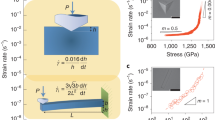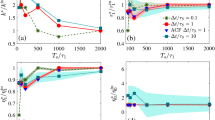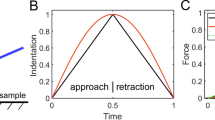Abstract
Scott Blair, Veinoglou and Caffyn1 have explained the rheological behaviour of certain complex materials in terms of ‘quasi-properties' ; that is, complex entities in which a number of magnitudes taken together describes the process which the material undergoes as a result of a specified test, the ordinary ‘properties', such as viscosity and elasticity, being changed by the testing process itself.
This is a preview of subscription content, access via your institution
Access options
Subscribe to this journal
Receive 51 print issues and online access
$199.00 per year
only $3.90 per issue
Buy this article
- Purchase on Springer Link
- Instant access to full article PDF
Prices may be subject to local taxes which are calculated during checkout
Similar content being viewed by others
References
Scott Blair, G. W., Veinoglou, B. C., and Caffyn, J. E., Proc. Roy. Soc., A, 189, 69 (1947).
Nutting, P. G., J. Franklin Inst., 191, 679 (1921).
Author information
Authors and Affiliations
Rights and permissions
About this article
Cite this article
BLAIR, G., CAFFYN, J. Further Experimental Evidence for the Theory of Quasi-Properties. Nature 162, 368–369 (1948). https://doi.org/10.1038/162368a0
Issue Date:
DOI: https://doi.org/10.1038/162368a0
This article is cited by
-
Strukturmechanik rheonomer Systeme XVII
Kolloid-Zeitschrift (1951)
Comments
By submitting a comment you agree to abide by our Terms and Community Guidelines. If you find something abusive or that does not comply with our terms or guidelines please flag it as inappropriate.



